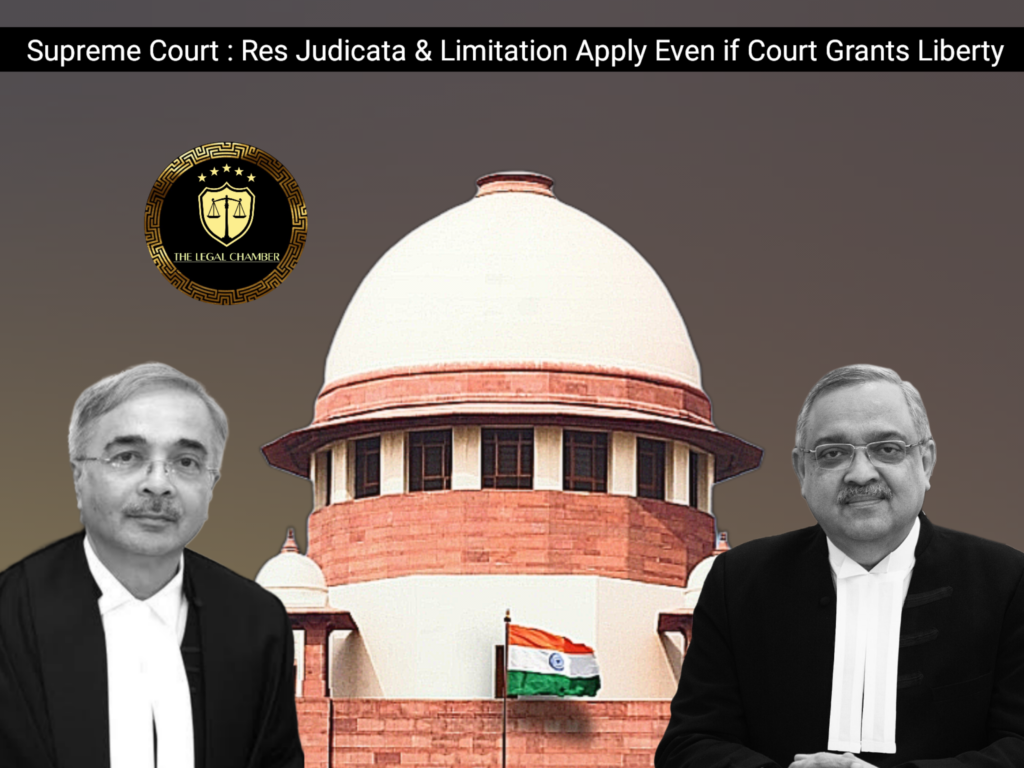
The Supreme Court held that the liberty granted by the High Court to file a fresh suit does not revive a time-barred cause of action or override the principles of res judicata. The Court affirmed that limitation under the Limitation Act and Order 23 Rule 2 CPC applies strictly, and a fresh suit cannot re-agitate issues already decided in prior proceedings. The judgment reinforces that judicial liberty cannot circumvent statutory bars or reopen conclusively adjudicated matters.
Facts Of The Case:
The case involved a dispute over a property transaction where the original plaintiff (predecessor of the petitioners) had entered into a sale agreement with the first defendant, a cooperative housing society. A Power of Attorney (PoA) was executed in favor of the society’s secretary (second defendant), which the plaintiff later alleged was obtained through coercion and misrepresentation. The plaintiff initially filed a suit for permanent injunction to prevent the defendants from alienating or developing the property, but the suit was dismissed by the trial court and appellate court. The High Court, in a second appeal, dismissed the case but granted liberty to file a fresh comprehensive suit.Relying on this liberty, the plaintiff filed a fresh suit seeking declarations that the sale deeds executed under the PoA were void, along with claims for possession and injunction. The trial court decreed in favor of the plaintiff, but the first appellate court reversed the decision, holding that the suit was barred by res judicata, limitation, and non-joinder of necessary parties. The High Court upheld this reversal, noting that the cause of action, if any, arose much earlier and the plaintiff’s claims had already been adjudicated in prior proceedings. The Supreme Court affirmed the High Court’s decision, emphasizing that judicial liberty cannot override statutory limitations or revive conclusively decided issues.
Procedural History:
The procedural history of the case began with the original plaintiff filing a suit for permanent injunction to restrain the defendants from alienating or developing the disputed property. The trial court dismissed the suit, a decision upheld by the first appellate court. The plaintiff then approached the High Court in a second appeal, which was initially allowed but later remanded by the Supreme Court. Upon reconsideration, the High Court dismissed the second appeal, finding no substantial question of law, but granted liberty to file a fresh comprehensive suit.Acting on this liberty, the plaintiff filed a fresh suit seeking declaratory reliefs, possession, and injunction. The trial court ruled in favor of the plaintiff, but the first appellate court reversed the decision, holding the suit barred by res judicata, limitation, and non-joinder of necessary parties. The High Court affirmed this reversal, emphasizing that the cause of action was time-barred and the issues had already been adjudicated. The Supreme Court, in its final ruling, upheld the High Court’s judgment, clarifying that the liberty granted earlier could not circumvent statutory limitations or revive settled disputes. The case thus traversed multiple judicial tiers before reaching its conclusive dismissal.
READ ALSO :Supreme Court Rules : Res Judicata Can’t Be Decided at Plaint Stage
Court Observation:
The Supreme Court made several critical observations in its judgment. It emphasized that the liberty granted by the High Court to file a fresh suit could not revive a time-barred cause of action or override the statutory limitation period under the Limitation Act. The Court reiterated that principles of res judicata strictly apply when issues have already been adjudicated in prior proceedings between the same parties. It noted that the plaintiff’s attempt to re-agitate settled matters through a fresh suit was impermissible, as the core dispute regarding the validity of the Power of Attorney and subsequent sale deeds had been conclusively decided against the plaintiff in earlier rounds of litigation. The Court also observed that Section 14 of the Limitation Act (which provides for exclusion of time spent in bona fide litigation) was inapplicable, as the earlier suit had been dismissed due to improper framing rather than being filed in a wrong forum. Additionally, it affirmed the High Court’s finding on non-joinder of necessary parties, particularly the development authority and badminton association, which had vested interests in the disputed property. The judgment underscored that judicial liberty cannot be used to circumvent substantive legal barriers, serving as a caution against frivolous litigation aimed at reopening settled disputes.
Final Decision & Judgement:
The Supreme Court dismissed the Special Leave Petition and upheld the High Court’s judgment, thereby affirming that the plaintiff’s fresh suit was barred by res judicata and limitation. The Court ruled that the liberty granted by the High Court to file a new suit could not resurrect a time-barred cause of action or evade the statutory constraints of the Limitation Act. It emphasized that the core issues—including the validity of the Power of Attorney, the sale deeds, and the plaintiff’s claims—had already been conclusively adjudicated in prior proceedings, making the fresh suit impermissible under Section 11 of the CPC. The Court also agreed with the High Court’s findings on the non-joinder of necessary parties, which further invalidated the suit. By rejecting the petition, the Supreme Court reinforced that judicial clemency, such as granting liberty to refile, cannot override substantive legal principles or revive dead claims, ensuring finality in litigation. The pending applications, if any, were disposed of accordingly.
Case Details:
Case Title: Smt. Arifa & Ors. vs. Abhiman Apartment Co-operative Housing Society Ltd. & Ors. Citation: 2025 INSC 875 Appeal No.: Diary No. 14976 of 2024 Date of Judgment: July 14, 2025 Judges/Justices: Hon’ble Mr. Justice K. Vinod Chandran & Hon’ble Mr. Justice N.V. Anjaria
Download The Judgement Here